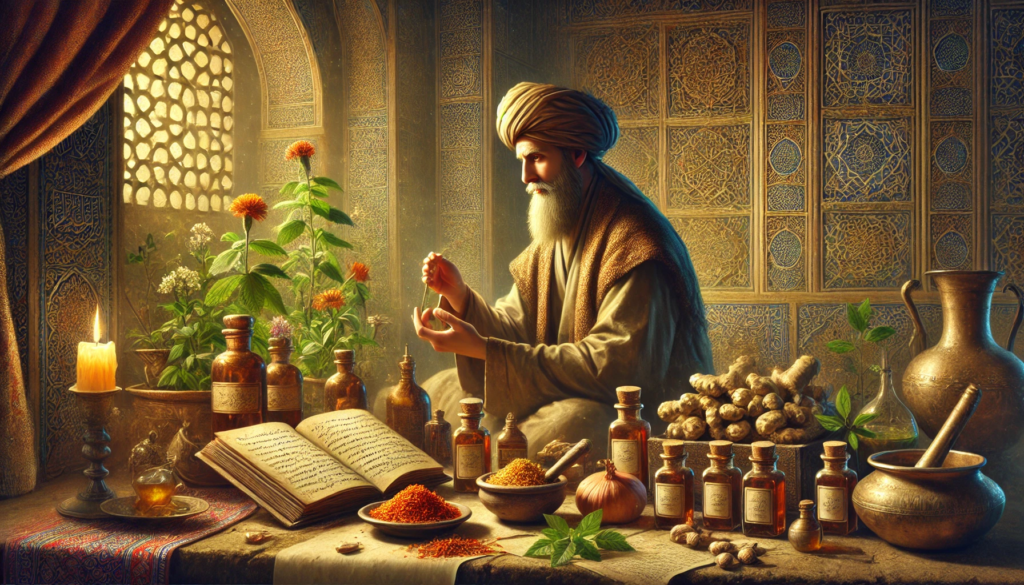SEXUAL PERFORMANCE IN MEN AND WOMEN ACCORDING TO AVICENNA
Introduction
Abu Ali al-Husayn ibn Abdullah ibn Sina, known in the Western world as Avicenna (circa 980 – 1037 AD), is one of the leading scholars of the Islamic Golden Age. Recognized for his groundbreaking work in medicine, philosophy, and pharmacology, Avicenna’s most famous work, « Al-Qanun fi’t-Tibb » (The Canon of Medicine), was regarded as a fundamental reference in both Eastern and Western medical traditions for centuries. Another significant encyclopedic work, « Kitab al-Shifa » (The Book of Healing), covers various scientific disciplines beyond medicine. In traditional Islamic medicine, sexual health was considered an essential component of general well-being and marital life. This report aims to examine Avicenna’s recommendations for enhancing sexual performance in both men and women, focusing on the herbal remedies and dietary suggestions documented in his works.
ENHANCING SEXUAL PERFORMANCE IN WOMEN
Avicenna discussed various factors influencing sexual performance and desire in women. In Persian medicine, sexual desire, referred to as « Bah », was closely linked to a strong and healthy body. Weakness in major organs such as the heart, brain, and liver was considered a primary cause of reduced sexual desire in women. This holistic approach underscores Avicenna’s perspective that sexual desire is interconnected with general vitality and organ health. Treatments, therefore, should aim to strengthen these fundamental systems.
Saffron (Za’faran)
Avicenna’s « The Canon of Medicine » and other sources mention several herbal remedies and dietary recommendations to enhance libido and sexual satisfaction in women. Saffron (Za’faran) was regarded as an aphrodisiac by Avicenna. Modern research has also shown that saffron may improve female sexual function, arousal, and desire while reducing pain during intercourse. The consistency between Avicenna’s recognition of saffron as an aphrodisiac and contemporary studies demonstrating its positive effects on various aspects of female sexual function serves as historical validation.
Bindii/Puncture Vine (Tribulus terrestris)
Another recommended herb is Tribulus terrestris (Bindii/Puncture Vine). Traditional texts, including Avicenna’s « Canon of Medicine, » mention Tribulus terrestris as a libido-enhancing agent that may increase sexual drive in women. Modern research indicates that this plant may improve desire, arousal, vaginal lubrication, and satisfaction while reducing pain in women with hypoactive sexual desire disorder. Similar to saffron, the traditional use of Tribulus terrestris for enhancing female libido is supported by contemporary studies showing improvements in various aspects of sexual function.
(NAMES:
Like many weedy species, this plant has numerous common names according to the world region, including 3-corner-jack, goathead, bull’s head, gopher-head, caltrop, cat-head, devil’s eyelashes, devil’s-thorn, devil’s-weed, puncturevine, and tackweed.)
Ginger & Jasmine oil
Avicenna also suggested ginger for sexual apathy, often recommending it with sweetened milk and poultry meat. The traditional role of ginger in treatments may be associated with its warming properties, which can enhance sexual desire. Another recommendation by Avicenna was massage with jasmine oil, particularly applied to the lower back, as a remedy for sexual disinterest. This suggests the importance of aromatherapy and topical applications in Avicenna’s approach to sexual health. Foods such as fish and natural poultry, often combined with bird meat, were also among Avicenna’s dietary recommendations for boosting sexual desire. The inclusion of these specific food types implies that Avicenna focused on easily digestible and nutritious foods in his dietary guidance.
While modern research supports the use of saffron and Tribulus terrestris for female sexual function, further studies are needed to specifically validate the traditional applications of ginger and jasmine oil in enhancing female libido.
ENHANCING SEXUAL PERFORMANCE IN MEN
Avicenna had a comprehensive understanding of male sexual function and described the physiology of erection in detail. He noted the involvement of two muscle groups, nerves, blood flow regulated by the heart and liver, and the influence of the brain in the process of erection. He identified various causes of erectile dysfunction, including penile disorders, reduced semen motility, and issues related to the heart, liver, brain, kidneys, and stomach. Avicenna’s detailed understanding of the physiological processes of erection demonstrates a remarkably advanced level of medical knowledge for his time.
In « The Canon of Medicine » and other sources, Avicenna documented various herbal remedies and dietary recommendations to enhance erection function, libido, and semen quality in men. Saffron (Za’faran) was classified as an aphrodisiac for men as well. Modern research supports its role in improving erectile function and sexual desire. Studies have shown that topical saffron gel can help improve erectile dysfunction in diabetic men. The alignment between Avicenna’s classification of saffron as an aphrodisiac and modern findings on its benefits for male sexual function highlights the enduring relevance of his observations.
Tribulus terrestris (Bindii/Puncture Vine)
Tribulus terrestris (Bindii/Puncture Vine) is another plant mentioned in traditional texts, including Avicenna’s « Canon, » as having the potential to enhance libido and sexual drive in men. Contemporary research suggests that it may increase sexual satisfaction in men experiencing low libido and erectile dysfunction. Similar to its effects in women, Tribulus terrestris has been traditionally used to boost male sexual performance, with modern studies supporting its role in improving erection and satisfaction.
(NAMES:
Like many weedy species, this plant has numerous common names according to the world region, including 3-corner-jack, goathead, bull’s head, gopher-head, caltrop, cat-head, devil’s eyelashes, devil’s-thorn, devil’s-weed, puncturevine, and tackweed.)
Ferula
Species of Ferula (Anjedan/Sakbinaj/Zallouh – Asafoetida/Ferula hermonis) have also been recognized by Avicenna and other traditional medical experts for their aphrodisiac properties. Modern studies on different Ferula species (e.g., F. hermonis and F. assa-foetida) suggest their potential to improve sperm parameters, erection function, and sexual motivation in animal models. The strong emphasis on Ferula in Persian traditional medicine, combined with emerging modern research, warrants further exploration of its potential benefits.
Musk
Avicenna prescribed musk as an aromatic cardiac tonic for erectile dysfunction resulting from heart issues. Traditional uses of musk included enhancing male strength and libido. His recognition of the link between cardiac health and erectile function aligns with modern awareness of cardiovascular factors in sexual health.
Avicenna also suggested that sweets could help improve blood production and support sexual power, while bird meat was recommended for sexual apathy. The association of sweets with sexual performance may be related to the energy boost provided by sugars, while bird meat, being an easily digestible protein source, could support overall vitality. Additionally, he acknowledged that cardiac disease could be a cause of erectile dysfunction, recommending the treatment of underlying cardiac conditions and the use of aromatic cardiac tonics (such as musk). Avicenna’s recognition of cardiovascular disease as a potential cause of erectile dysfunction predates modern understandings of the connection between cardiovascular and sexual health, demonstrating his advanced clinical observation skills.
Modern research supports the use of saffron and Tribulus terrestris in improving erectile function and sexual desire in men, aligning with Avicenna’s insights. The well-established link between cardiovascular health and erectile dysfunction in modern medicine further validates Avicenna’s observations. While musk has been traditionally used to enhance sexual performance, rigorous scientific evidence is needed to confirm its effectiveness.
Conclusion
Avicenna’s recommendations for enhancing sexual performance in men and women include herbal remedies such as saffron, Tribulus terrestris, and Ferula, dietary suggestions, and the emphasis on overall health. Some of his observations from a millennium ago remarkably align with modern scientific findings. This highlights the enduring value of traditional medical knowledge. However, it is essential to evaluate Avicenna’s recommendations within their historical context and consult healthcare professionals regarding any sexual health concerns in light of contemporary medical understanding and individual health conditions.
Table 1: Herbal Cures and Their Benefits That Increase Sexual Performance in Women According to Ibn Sina
| Plant (Herb) | Benefits According to Ibn Sina | Modern Research |
| Saffron (Zaafran) | Aphrodisiac | It may enhance sexual function, arousal, and desire, while reducing pain during intercourse. |
| Tribulus terrestris (Bindii/Puncture Vine) | It affects libido and may enhance sexual drive. | It may increase desire, arousal, vaginal lubrication, and satisfaction while reducing pain. |
| Ginger | Against low sexual desire. | Traditional use, limited modern research. |
| Jasmine Oil | Against low sexual desire (with massage). | Traditional use, modern research limited |
| Fish and Natural Chicken Meat | Against sexual disinterest. | As nourishing foods, they support overall health. |
Sources / References
Natural Things Shop uses only high-quality sources to support the facts in our articles. Read our editorial process to learn more about how we fact-check our content and keep it accurate, trustworthy and reliable.


